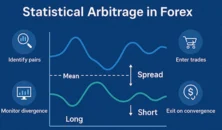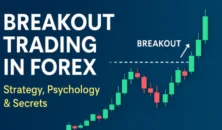
The Forex market (Foreign Exchange) or global currency exchange market is one of the largest and most liquid financial markets in the world. It handles daily trading volumes worth billions of dollars, enabling investors, corporations, banks, and governments to trade various currencies. In this article, we will explore how the Forex market functions and its key roles.
Structure of the Forex Market
Unlike traditional stock markets, the Forex market is decentralized. It operates as an OTC (Over-the-Counter) market, meaning there is no specific physical location for transactions. All Forex transactions occur through a network of banks, financial institutions, brokers, and individual traders. This structure allows the Forex market to remain open 24 hours a day, five days a week.
The Forex market consists of two primary segments:
- Spot Market: In the spot market, currencies are traded instantly at current prices. These transactions are typically settled within two business days.
- Forward & Futures Market: This segment involves contracts that set currency prices for future transactions. It allows traders to hedge risks or speculate on future price changes.
Key Factors Influencing the Forex Market
Several factors significantly impact currency prices in the Forex market, including:
- Interest Rates: Central banks influence currency values by adjusting interest rates. Generally, when a country’s interest rate rises, its currency strengthens because investors prefer to invest in currencies with higher returns.
- Macroeconomic Indicators: A country’s economic performance, including GDP growth, unemployment rates, and inflation levels, affects its currency’s strength.
- Political Landscape: Changes in government policies, political instability, and election news can influence confidence in currencies, leading to volatility.
- Global Events: Global economic crises, wars, fluctuations in oil prices, and other international developments can impact the Forex market.
Key Players in the Forex Market
- Central Banks: Central banks are the most influential players in the Forex market. They implement monetary policies, set interest rates, and control market liquidity through open market operations. Major central banks affecting the Forex market include the U.S. Federal Reserve, the European Central Bank, the Bank of England, and the Bank of Japan.
- Financial Institutions and Investment Firms: Large banks, insurance companies, and pension funds account for a significant portion of Forex trading volume. These entities trade currencies to manage exchange rate risks or generate profits.
- Brokers: Brokers act as intermediaries, providing access to the Forex market for individual traders and institutions. They offer various services, including trading platforms, market analysis, advisory services, and execution of buy and sell orders.
- Individual Traders: Many individuals participate in the Forex market through brokers. They use technical and fundamental analysis to trade currencies and can play a role in short-term market fluctuations.
- Corporations and Merchants: Businesses enter the Forex market to facilitate international trade and currency payments. These companies often use Forex to convert currencies and indirectly influence exchange rates.
Forex Trading Strategies
Forex trading involves various strategies, broadly categorized into technical and fundamental analysis:
- Technical Analysis: This strategy focuses on studying price patterns and using tools like charts and technical indicators to predict future price movements.
- Fundamental Analysis: Fundamental analysis examines economic and political factors affecting currency values.
Conclusion
The Forex market is a complex global marketplace where economic, political, and financial factors influence currency prices. Understanding the structure of this market and the roles of key players, such as central banks, financial institutions, brokers, and individual traders, is essential for anyone looking to participate. Staying informed about global trends and employing effective strategies can help traders navigate this volatile market successfully.
Keep Learning :

Related Topic :







